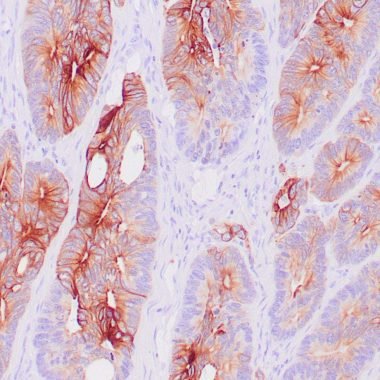
The Cytokeratin 20 (CK20) Mouse Monoclonal Antibody is a highly specific and sensitive reagent developed for the detection of CK20, a type I intermediate filament protein prominently expressed in gastrointestinal epithelium, urothelium, and Merkel cells. This antibody is widely used in immunohistochemistry (IHC) on formalin-fixed, paraffin-embedded (FFPE) tissue samples to identify and differentiate epithelial tumors, particularly those of gastrointestinal and urothelial origin. CK20 expression is a valuable diagnostic marker in a range of malignancies, including colorectal adenocarcinoma, transitional cell carcinoma, gastric carcinoma, and Merkel cell carcinoma. The antibody provides strong cytoplasmic staining with minimal background, enabling pathologists to accurately detect CK20-positive cells in both normal and neoplastic tissues. It is especially useful when used in combination with CK7 antibody in the CK7/CK20 immunophenotyping panel for determining the tissue of origin in metastatic carcinomas. This mouse monoclonal antibody delivers consistent, reproducible results and is optimized for use in clinical pathology and research laboratories. Its robust performance makes it an essential tool in cancer diagnostics, aiding in tumor classification, differential diagnosis, and the study of epithelial cell biology. Available in both concentrated and ready-to-use formats, the CK20 antibody is compatible with automated staining systems and various detection platforms.
Mouse
Recombinant fragment of human KRT20 protein (around aa 196-323) (exact sequence is proprietary)
GM208
IgG1 / Kappa
IHC analysis of formalin-fixed, paraffin-embedded human colon. CK20 Mouse Monoclonal Antibody (Ks20.8). HIER: Tris/EDTA, pH9.0, 45min. 2°C: HRP-polymer, 30min. DAB, 5min.
Human
HT29 cells. Human colon or prostate carcinoma.
Cytoplasm